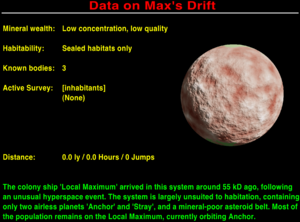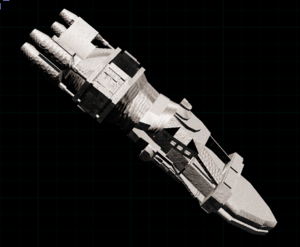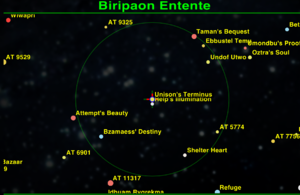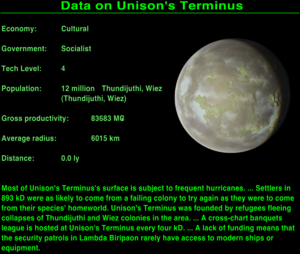Difference between revisions of "Talk:Exploration"
Wildeblood (talk | contribs) (→Questions) |
Wildeblood (talk | contribs) m |
||
| Line 54: | Line 54: | ||
The simplest way to distinguish between single- and double-precision computing is to look at how many bits represent the floating-point number. For single precision, 32 bits are used to represent the floating-point number. For double precision, 64 bits are used to represent the floating-point number.") | The simplest way to distinguish between single- and double-precision computing is to look at how many bits represent the floating-point number. For single precision, 32 bits are used to represent the floating-point number. For double precision, 64 bits are used to represent the floating-point number.") | ||
| − | That's why Redspear, and anyone else who wants to, can now do re-scaling experiments, and put things right over there -----> without them getting all jittery looking. | + | That's why Redspear, Stranger, and anyone else who wants to, can now do re-scaling experiments, and put things right over there -----> without them getting all jittery looking. |
=== Personal views === | === Personal views === | ||
Revision as of 15:25, 27 February 2024
Leaving aside any discussion of alternative galaxy seeds for now (mainly because it causes the devs to blow their minds), as you say to perform meaningful "exploration" in Oolite requires two matters.
Ignorance about what one is exploring! Game modifications enhancing the act of exploration!
Although I'd express myself without the bangs!
Back in the olden days, we didn't have a method to conceal chart data. If Explorers' Club were being created now, it would look like Zero Maps or Here Be Dragons. There'd be an option (Murphy and I both liked adding more and more options to existing OXPs) when you first installed it, asking whether you'd prefer travelogue mode (what you're familiar with) or a harder exploration mode with the charts initially concealed. That would be a one-time choice, and you'd have to start over if you changed your mind.
As previously discussed, Explorers' Club is easily modifiable, so the question of how much work should a player be required to do to count a system as "visited" or "explored" is an open one: it can be made as easy as jumping in and out again, or as hard as any mission you could devise. Be wary though, that Oolite is a game, and we're supposed to be entertaining the player, not testing their patience. (Something the devs forgot with the loathsome Oolite 1.82.)
Getting away from Explorers' Club, exploration can be viewed at two levels: the chart level or the flying about, pew-pew, level. Flying about, the player needs more docks to visit, and more astrophysical things to see. Tianve and ringed planets are good(-ish). The criticism made by several people is that OXP creators make one of two errors: they "adopt" one home system and add as much embellishment to it as they can, ignoring that other players may only ever see all their effort once in passing; or at the other extreme, they feel a need to add their new space-dock design to almost every system, where it soon becomes boring. Relatively few seem to understand there's a huge range between 1/2048 and 1024+/2048.
I'm not much interested in the flying about level of Oolite, which I consider largely a lost cause. It needs a distinct vision of a particular look-and-feel to aim for, and a concerted effort to make existing and new OXPs consistent with that vision. It won't happen.
At the level of making planning a route to travel across the galactic chart more challenging for the player, I see several possibilities. I'm currently toying with three.
Tachyona - is a clumsy first attempt at using 2 or more planets on the chart, disguised as a single planet, to simulate cycles of planetary movement at the chart level. (Not to be compared to things like Orbits OXP that did it within the instantiated system.)
The Witches of Middlemap - there's a demonic looking pentacle smack-bang in the middle of chart 1. If you haven't noticed, concealing several of the nearby systems makes it much more obvious. Trapping the player within is a relatively trivial exercise. Forcing the player to appease the witches in order to escape is step two. Rewarding the player by revealing the hitherto hidden systems would follow.
The Hidden Path - would involve hiding the gal-drive completely in normal play, and occasionally substituting a galaxy jump for a normal jump without informing the player. Yes, this IS the system I was heading to, but what happened to the one I came from!?
Contents
Discussion on Wildeblood's views above
Questions
- 1) If I can try to recapitulate:
Two aspects? types? of exploration. Chart level where the chart and its solar systems should be genuinely "discovered" (need to be hidden). Flying about "pew-pew" level where one explores an individual system.
Why "pew-pew"? I don't understand the nuance, I'm afraid.
As every schoolboy knows, it's the sound a ray gun makes. Are you aware of a technology called television?
- 2) I'm unsure how what you've written above fits in with how you regard Szaumix & Switeck as possibly sharing your view.
Perhaps I misread them, or misremember the conversation completely, but the discussion I recall reading had them and hiran in furious agreement. Each making the point I made above: there's a world of possibility between 1/2048 and 2048/2048. Interesting things to catch the player's attention need to be added. To more than one system, but not all over the place. All things in moderation, you know.
- 3) How about a different way of putting the question: What emotionally thrills you about exploration? And, are there any exploration moments from your playing Oolite or any other game which you look back on with enjoyment?
Yes. But they've been removed from Oolite. One night I wondered whether the system instance one flies about in was a "boxed" space. We all know that only the current system is instantiated, and that you can't fly from one system to another without a "witchspace jump", during which terrible things happen to the friends you leave behind, and the new system is instantiated out of nothingness. But... I decided to try to fly to another system anyway. I wanted to know whether the game included any mechanism to deter such an action (it didn't), and whether eventually I'd hit the side of a box and be unable to go any further (I didn't).
Anyway, out there space casually ignores things considered laws of physics in less turbulent parts of the galaxy. There was a planet and a station that I had put out there, and I attempted to dock. I couldn't do it, because the station was jittering about all over the place. One couldn't dock, or shoot things, or scoop things, because everything was jittering about. I reported my findings to the BB. Ayton said, "You're not supposed to go that far out." I replied that I already had and that's what I saw. He said they'd thought they could make do with single precision calculation for the ooniverse's co-ordinates, but now they would change it to double-precision. Which they did.
(People also ask: "What is double precision and single precision? The simplest way to distinguish between single- and double-precision computing is to look at how many bits represent the floating-point number. For single precision, 32 bits are used to represent the floating-point number. For double precision, 64 bits are used to represent the floating-point number.")
That's why Redspear, Stranger, and anyone else who wants to, can now do re-scaling experiments, and put things right over there -----> without them getting all jittery looking.
Personal views
There are four genuinely enjoyable exploration moments I've had in Oolite (bear in mind I've not played any other space games other than Classic Elite)
- 1) When I first played with Redspear/Spara's Additional Planets. The views! Jumping about from one planet to another. This eventually cloyed when I realised that the planetary configuration never changed - that they are all arranged at the same side of the sun so that they look good and its easy to jump from one to another.
- 2) When I added in your Distant Suns OXP. Arriving at a planet with a blue star and everything very dim! What an unforgettable moment!
- 3) Starting Stranger's World and travelling the immense distances (20-30 mins) from one planet to another. Much more realistic. But not much to do on arrival.
- 4) SOTL Exploration. Brilliant! Searching for asteroid clusters - what fun! What a shame it is unfinished. (SOTL AltMap is also very enticing, but again, needs even more work)
Brainstorming
- 1) It would be super to make more of SOTL Exploration.
It needs a better HUD, stuff to do with the resources one discovers, possibly hiding the chart (apart from what the mother ship already knows - ie part of the path taken to get there} and then including more instrumentation to discover the unknown systems!), and better models/textures (ship, "Local Maximum" station which should be another ship). And possibly a more sophisticated "career path".
We could add in the phkb's Tianvean pulsar, his Black Hole and maybe even some real asteroid rings (Commander Frame implied that he was working on this, and there might be relevant code in the "brilliant but broken" Tetiri Planet Ring OXP).
And in terms of adding bases at other planets, phkb's Hermitage might be adaptable (it has code for developing your Rock Hermit).
We could use the Final Capital ship (pictured) or a Generation Ship for the Local Maximum colony ship. And pillage phkb's recent Alternative Rock Hermits for the growing Rock Hermit at a new system - and work in how to carry passengers there (passenger berths?).
- 2) SOTL AltMap
This would take much more work. But there are rival blocks of worlds, possible wars, unpopulated worlds, etc. Adding in chart-hiding could make it very exciting! More political systems to work with, different species, etc. It needs an ambience retexture. Some Navies. Unsure about how well the NPC AI use of Torus drive works when it comes to combat.
- 3) Why is the "flying about level" a lost cause?
The vanilla-game descriptions give us a host of differences which can be built upon in-game.
We have OXPs which add in politics (we need a Corporate Systems OXP, and to decide how best to handle Democracies, Multi-Govs & Confederacies). More could be done (make something of Comoonin for example - those systems which belong, and those which don't).
We already have a textual differentiation regarding wealth, population & species which can be built on. Real differences for lobstoid worlds, for example. The ships (ship models, their responses to the player), the stations (what is available there, the docked experience, special stations - Witchspace Lobstoid shrines?), the downplanet experience (see DGill's work on Feudal States) etc. Redspear has done this to a limited extent. See his Alien Systems OXZ, Solos Alt Stations, & New lasers OXPs.
We would need to see if we can come up with something reasonable for the effects of wealth and population (SWEconomy does this for wealth).
We can add in more religion and have it make a real difference.
The OXPs are tweakable We can come up with a suite of tweaked OXPs which create a Ooniverse for a decent "flying about level" exploration game. And using the scenario.plist exclude all other OXPs which might wreck it.
Thus any issues arising from conceptual clashes between say the Anarchies & Feudal States OXPs could be dealt with.
- Cholmondeley 11:26, 27 February 2024 (UTC)




